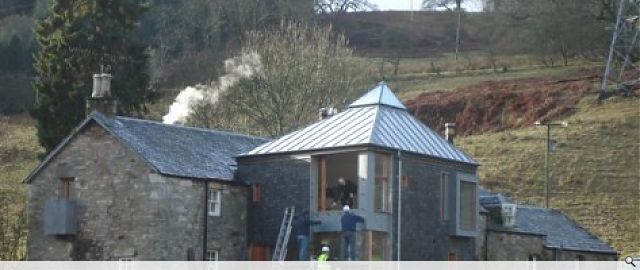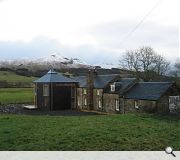Braefoot
A pavilion form, i.e. a form which had some degree of visual autonomy was chosen because it allowed the existing building to retain its strong presence and sit comfortably within a new composition of house and extension. This creates a parti of ‘long and low’ contrasting with ‘compact and tall’.
Braefoot has a ‘crumbly’ and uneven appearance and for the new works, second hand slate-hung walls and zinc sheeting for the roof and were used to produce a similar monochromatic tone.
The existing building is mostly solid with small, vertically-proportioned windows while the extension maximises the solid into large ‘panels’ and groups other openings together allowing only the tiniest of peep-hole openings as hole-in-the-wall windows. It does not attempt to draw comparisons between existing and new openings since each belongs to a different construction. The resulting architectural character is crisp and contrasts with the soft nature of the existing building. The extension sings in harmony rather than in unison with the old.
PROJECT:
Braefoot
LOCATION:
Dumgoyne, Glasgow
CLIENT:
Jenni and Gordon Bulloch
ARCHITECT:
studioKAP
STRUCTURAL ENGINEER:
Woolgar Hunter
Suppliers:
Main Contractor:
Standard Construction
Glazing:
Woodwise
Roofing:
VM Zinc
Back to Housing
Browse by Category
Building Archive
- Buildings Archive 2024
- Buildings Archive 2023
- Buildings Archive 2022
- Buildings Archive 2021
- Buildings Archive 2020
- Buildings Archive 2019
- Buildings Archive 2018
- Buildings Archive 2017
- Buildings Archive 2016
- Buildings Archive 2015
- Buildings Archive 2014
- Buildings Archive 2013
- Buildings Archive 2012
- Buildings Archive 2011
- Buildings Archive 2010
- Buildings Archive 2009
- Buildings Archive 2008
- Buildings Archive 2007
- Buildings Archive 2006
Submit
Search
Features & Reports
For more information from the industry visit our Features & Reports section.




